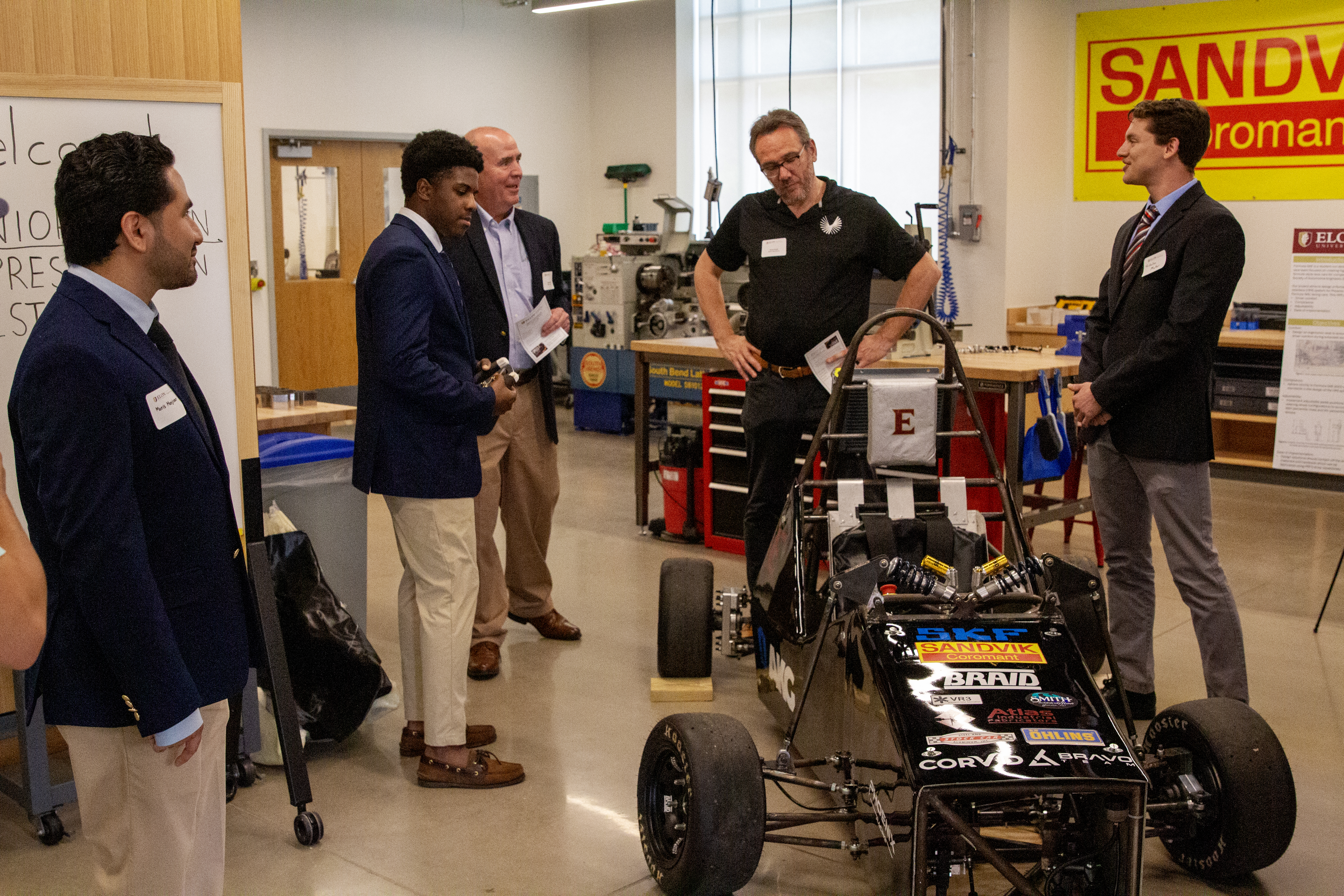Six teams of engineering majors presented the results of prototyping and design work in the Senior Projects in Elon Engineering Design program, a yearlong partnership between Elon students and regional businesses and organizations.
A domestic filter cartridge that removes PFAS chemicals from drinking water. A race car designed to comfortably seat drivers from 5 feet 1 inch to 6 feet 3 inches tall. A landscape redesign that solves a drainage issue at a local park.
These were a few of the solutions Elon’s engineering seniors unveiled to stakeholders and community partners at the Senior Projects in Engineering Design (SPEED) Presentations on Friday, May 10, in Founders Hall. SPEED is a signature aspect of Elon’s Bachelor of Science in Engineering degree program, providing students the opportunity to work with professional partners over their senior year and apply their skills to solving real-world problems.
Twenty-five engineering majors collaborated with businesses and organizations on six projects throughout the 2023-24 academic year, meeting bi-weekly with stakeholders to discuss progress toward project goals. Partners with the Department of Engineering’s SPEED program this year included BNNano, Inc., of Raleigh, North Carolina; Wastequip LLC, of Charlotte, North Carolina; The City of Graham Recreation and Parks Department; Alley, Williams, Carmen and King, Inc., of Burlington, North Carolina; the Piedmont Triad Regional Council; and Elon’s own Phoenix Racing Team.
“It was exciting to hear BNNano’s ideas and see their concepts throughout the project. They gave us free rein to design different experimental setups and work through those iterations,” said Avery Johns ’24, of Nashville, Tennessee.

Johns was a member of one of two teams collaborating with the company to design and prototype a household device to filter harmful PFAS — per-and polyfluoroalkyl substances, often referred to as “forever chemicals” — from drinking water. Her team’s design incorporated BNNano’s proprietary boron nitride nanobarbs in sponge and pellet form and two flow-controlling discs inside the filter cartridge. Working with Associate Professor of Chemistry Justin Clar, their tests showed the device wasn’t effective at removing the chemicals in free-flowing water, but their project lays the groundwork for future research the company could pursue.
“Learning how to communicate ideas effectively, listen to others’ ideas, delegate tasks and come together as a team was the most valuable part of this experience,” said Johns, who enrolls in Eastern Michigan State University’s Master of Science in Orthotics and Prosthetics program this fall. “Those are skills I will draw upon in my career.”
Career readiness is a key outcome of the SPEED program and is why the Department of Engineering places so much value on local and regional partnerships, said Assistant Professor of Engineering Will Pluer, who coordinates SPEED. Elon’s engineering curriculum is unique in an approach that provides students with hands-on, team-based learning experiences from day one and in each academic year. The curriculum hones students’ technical prowess while infusing courses with liberal arts perspectives.

“Students leave with a year of real-work experience with a partner company under their belts, and that jumpstarts them in their professional careers and puts them head and shoulders above their peers,” Pluer said. “They practice their engineering skills through the design and prototyping process, and they develop their soft skills in sending professional emails, holding meetings with stakeholders, and incorporating feedback into their work.”
One of this year’s stakeholders was Elon engineering alumnus Matthew Del Valle ’21, a new product development engineer at Wastequip, a waste management solutions manufacturer. Del Valle met regularly this year with two teams designing a tabletop-sized food compactor to remove excess water from food waste for more efficient transport of compost.
“Seeing the growth in these students over the last 10 months of ideating, scoping and problem-solving has been energizing. Teaching and working with them is the best part of this process,” Del Valle said. ”As an Elon engineering alumnus, this is an awesome opportunity to see how the program is growing.”

Brian Faucette, recreation and parks director for the City of Graham, worked with students to design an environmentally friendly way to manage flooding at South Graham Municipal Park. A hydrant in the park has to be regularly flushed to maintain city water quality, creating a large pool in part of the parking lot. Elon students engineered a swale — a vegetated waterway that collects water and grows beneficial plants — and designed a graded concrete barrier to direct drainage into it. Students built the swale, and Faucette said the department is looking for funding to implement their drainage design at the park.
“This is definitely a real-world problem that they solved, and it’s one we could replicate at other sites where this is an issue,” Faucette said. “The students were professional, asked great questions and gave us lots of options to choose from.”

Nicholas Muller ’24 of Mooresville, North Carolina, is a co-founder and team principal of Phoenix Racing — a student-led team constructing an electric racecar to compete against international engineering teams in Formula SAE electric vehicle competitions. The SPEED course added structure to the extracurricular, after-hours work the team puts in at the Clark Prototype Lab in Founders Hall and deepened skills he’ll take with him as a mechatronics engineer at Bravo Team LLC in Mooresville following graduation.
“While the Phoenix Racing experience provided foundational skills in teamwork, project management, and problem-solving, SPEED introduced critical lessons in money management and budgeting. It also offered more frequent engineering design reviews, allowing for deeper engagement with iterative design and troubleshooting,” Muller said. “This combination of hands-on practice and structured learning has prepared me well for the demands of a professional engineering career.”



